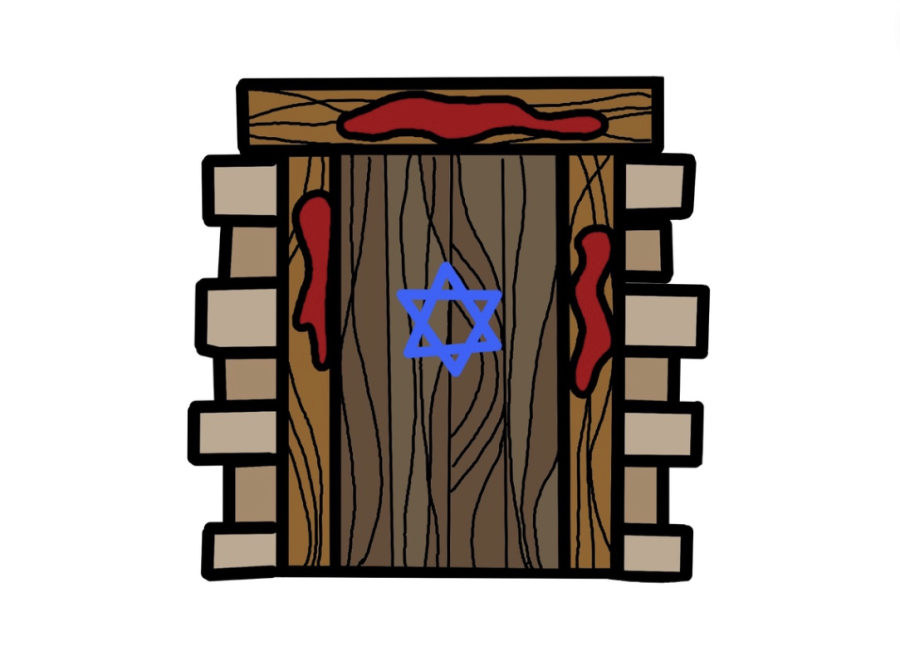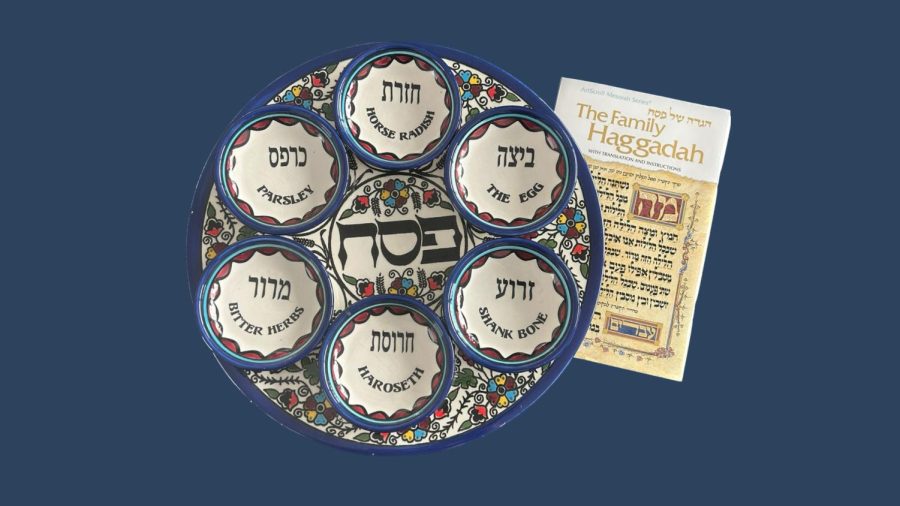Pesach Dvar Torahs
April 21, 2023
DOORPOST: In the Pesach story, blood on the doorposts of their homes kept Israelites safe during the 10th Plague.
Pesach is behind us. Why was it the peak of the year?
Pesach is now behind us, and looking back on all the chaos of the climax of the Jewish calendar, something constantly crosses my mind. Why Pesach? Why is Passover the most decorated holiday of the year?
It has never made sense to me. Why not Yom Kippur, the holiest holiday, or Rosh Hashanah, the holiday that starts the new year, or even Sukkot, when we literally build a hut outside of our houses to eat in?
It just doesn’t make sense. In order to answer this question I took a deeper dive into the Pesach story, specifically Parshat Bo, where the story happens.
Over the course of my research, I came across a commentary by Rabbi Moshe Aberman in a d’var Torah he wrote for Yeshivat Har Etzion. Rabbi Aberman offers insight into this by posing another question: Why did the Israelites have to put blood on their doorposts to signify which were the Jewish homes? Would God not know which homes were Jewish and which were Egyptian?
He says that the Mekhilta, a commentary written by Rabbi Ishmael around the third century in Israel, provides an answer. The blood was not meant rather to represent where the mitzvot of brit milah (circumcision) and korban Pesach (the Passover sacrifice) had been accomplished. Then,a 12th-century midrash in the Midrash Lekech Tov of Tobiah Ben Eliezer, explains that the Jews in Egypt were actually not circumcising their baby boys.
A mitzvah as old as Avraham Avinu was no longer being practiced by the Jewish nation. A mitzvah so simple that it’s over just eight days after you’re born, so basic that it is how you start life. Even God could not understand why people were not doing it.
Midrash Lekech Tov explains: when the korban Pesach was commanded by God, Moshe told the Jewish people that it could not be eaten by anyone who had not had a brit milah. So out of fear of losing God’s protection during the 10th plague, the nation performed this mitzvah.
What this teaches us is that the mitzvah of spreading blood on the doorpost was at least partly a way for God to re-institute the most fundamental mitzvah of all, milah. Milah was the most fundamental distinction between Bnei Yisrael and other nations. It was a symbol of Jewish identity, and whether during a period of exile or when learning Torah was forbidden, there was always that distinction for our nation.
Since the time of Avraham, the time of enslavement in Egypt was the only time the Jews had not had that distinction. That is why God emphasized it so much – because it brought the nation together.
This begins to answer my initial question.
Why Pesach? No matter who you are, what you do for a living, or if you are Haredi, Reform, Conservative, or Orthodox, every Jew around the world for at least one night a year takes a moment to remember their history. It is the holiday that makes a Jew remember they are a Jew.
It is the day in the Jewish calendar when we remember where we came from and who we are. It is fundamental to our religion.
It may not be the holiest, signifying the year to come, or an uprooting of our daily lives for eight days to remember how we traveled under God’s protection in the desert. But Pesach is the holiday that represents community, that represents togetherness, that represents one nation. It reminds us of when the Jewish nation came together, rose against Pharaoh, and began our lives as the Jewish nation.
It is the time when we introduce ourselves to the rest of the world.
That is why Pesach. Because it represents the fundamental difference between Bnei Yisroel and other nations. Although old in years, Pesach is the modern symbol of Jewish identity.
ENOUGH: ‘Dayenu,’ sung during the Magid section of the seder, lists many things God did when the Jews left Egypt and says each one would have been sufficient without the next.
Dayenu: Not enough to say it once
Dayenu – we say it at the end of the seder’s Magid section and it means, “It would have been enough.” But if you read the actual words of Dayenu, it is clear that it wouldn’t have been enough. In fact, Dayenu is kind of a ridiculous passage.
Some of its words are, ”If He had given us their wealth and had not split the sea for us, dayenu, it would have sufficed us!” No it wouldn’t have. Egypt would have caught up to us and we’d all be dead or still enslaved.
“If He had supplied our needs in the desert for 40 years and had not fed us the manna, still, dayenu, it would have sufficed us!” No, it would not have been enough, because we all would have died from hunger.
If what we’re saying isn’t true, why are we even saying it? It doesn’t make sense.
I personally believe that the reason we do this has to do with showing gratitude. Gratitude is so important in Judaism. We say thank you all the time. The only definite bracha commanded verbatim in the Torah is in Birkat Hamazon, the grace after meals. Ve’achalta, v’savata, u’verachta et Hashem Elokecha al haaretz hatovah asher natan lach. “When you have eaten your fill, give thanks to your God for the good land given to you.”
Why is saying thank you so important?
I was looking into it and then I realized that I didn’t need to look that far.
Gratitude has a personal element in my life. I was known as a super positive person among my friends from like late eighth grade onward. One time a friend texted me asking me for help with positivity and I had no idea what to do. In a moment of just thinking on my feet I said, “Tomorrow morning, text me five things you’re grateful for. They can be anything at all. Anything you can think of that you are grateful for.” So she texted and I responded.
And we did this every day and continue to do it to this day.
I started to realize that this was affecting my life in a great way. I realized that I was happier, healthier, more positive about myself and things going on in my life. People were asking me why I was like this, and I realized that it was because of gratitude.
Okay, so gratitude is great, who cares? Why are we still saying it every time in Dayenu even if it isn’t true?
It’s because of one of the most important factors in anything in our lives, which is building a habit or pattern. There are patterns every single day in our lives and we have tons of habits, both good and bad. Maimonides said that when it comes to charity, it is better to give one dollar every day for a year, as opposed to $365 once a year. The reason for that is so that we build a habit of giving charity.
So the reason we say thank you again and again in Dayenu is to build a habit of it. The reason my life was so impacted by gratitude was because I did it every day. The reason we say thank you again and again in Dayenu is to build a habit of it. The reason my life was so impacted by gratitude was because I did it every day.
That is why we say it would have been enough every single time. The haggadah is teaching us to be grateful for everything.
So when you go into Pesach this year, remind yourself of things to be grateful for. Trust me, it will only bring good things.

